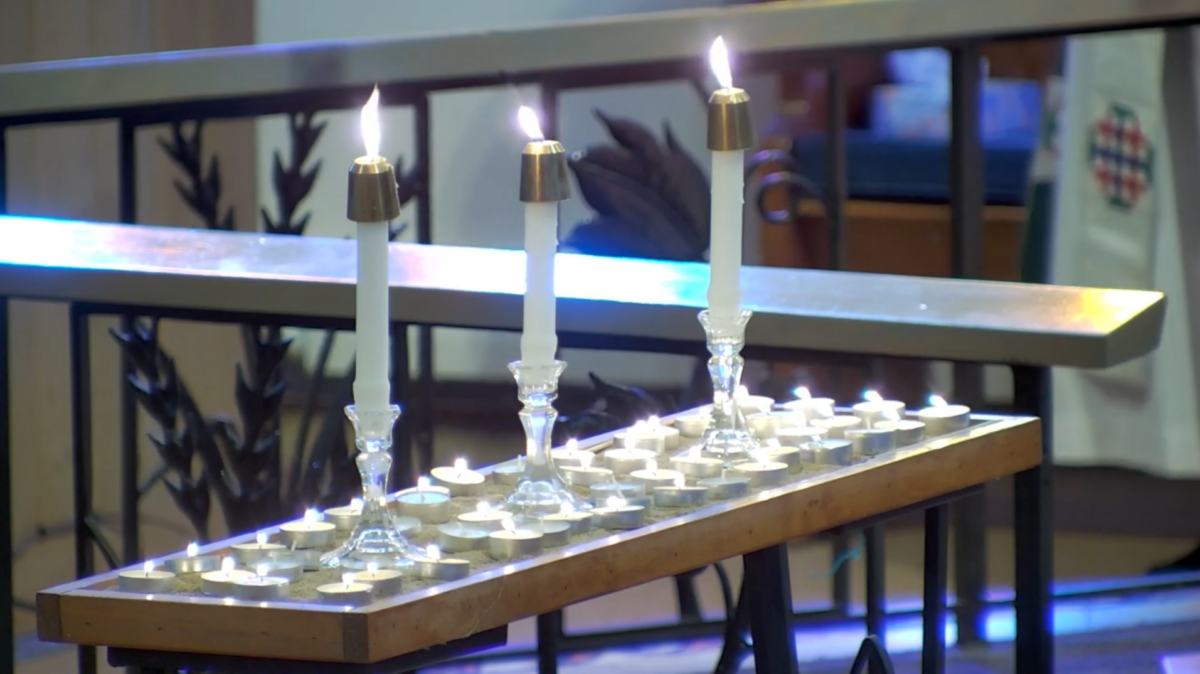In the Communion of Saints

When I was in high school, my oldest brother took great delight in asking people – What’s the shortest verse in the Bible?
Do you know what it is?
It’s in this morning’s gospel reading from John – verse 35 – “Jesus wept”.
Now if you are paying attention you will tell me that’s not what you heard in the reading today – today we read that “Jesus began to weep”. That’s a difference in translation – it’s the difference between the New Revised Standard Version of the Bible we use today and the Revised Standard Version that we used when I – and perhaps many of you – was growing up in the church.
So, Jesus wept.
Jesus wept when he found his friend, Mary, and the people who were with her, weeping over the death of Mary’s brother, Lazarus.
Jesus wept when he saw Mary’s grief and felt her pain.
Jesus wept from his own grief and pain, as he approached the tomb, the cave, where Lazarus had been placed after he had died, 4 days earlier.
Jesus wept with compassion and solidarity, for his friend, with whom he had a deep and meaningful relationship.
Jesus wept because he loved Lazarus and Mary and their sister Martha.
Jesus wept because he was not afraid to be human; not afraid to love his friends deeply; not afraid to express what he is feeling; not afraid to live fully and authentically as the unique person that God had created him to be.
So, Jesus wept because Jesus was human.
It’s likely that you too have wept with grief and pain over the death of someone you loved.
It’s likely that you too have wept with compassion and solidarity when you have learned of a tragic death or a sudden death or someone dying at a young age.
Grief – that feeling of deep sorrow – is a natural human response that we experience after loosing a loved one – through death or a broken relationship or a change in life’s circumstance or some horrific experience (Here I’m thinking of the impact of natural disasters – hurricanes and tornadoes and wild fires – that destroy lives and property and most everything that is dear to a person.).
And grief is a feeling that can linger with us, in our heart and soul and body, and then come back and overwhelm us even years after we first experience the loss. A familiar sight – or a favorite song – or a smell – can remind of us of the one we loved – and suddenly we have tears in our eyes again; suddenly we are remembering that person, and missing them again, as if it was just yesterday that they were still with us.
(For me – it’s the smell of lilacs that always brings thoughts of my mom back to me; my son is reminded of his grandma whenever he sees a cardinal, mom’s favorite bird).
Have you wept with grief, like that, years after your loved one has died?
Well, friends, that’s ok. Actually, that’s just fine. That’s what it means to be human; to love deeply; to express what we are feeling; to live fully and authentically as the unique person that God has each one of us to be.
So, we weep, grieved by death and by loss, because we are human.
And God sees our grieving and our weeping and our sorrow and God surrounds us with God’s love; a love made know to us through the life, death and resurrection of Jesus Christ; a love so strong it raised Jesus from the dead and gave him new life at the right hand of God.
As followers of Jesus, we trust that life springs forth from death. We trust that those we love who have died in Christ are raised with Christ. Death is not the end; rather, it is the beginning of new life in Christ.
As followers of Jesus, we know that love is stronger than death.
As followers of Jesus, we believe that all the saints – all God’s people – both the living and the dead – are joined together, through Christ, into the communion of saints. We confess our belief in the communion of saints in these words of the Apostles’ Creed (which we will confess together in a few minutes):
I believe in the Holy Spirit, the holy catholic church,
the communion of saints, the forgiveness of sins,
the resurrection of the body, and the life everlasting.
This is the work of the Holy Spirit, who “calls, gathers, enlightens, and makes holy the whole Christian church on earth and keeps it with Jesus Christ in the one common, true faith” and who will “On the last day…. raise me and all the dead and will give to me and all believers in Christ eternal life.” (Luther’s Small Catechism).
So, we are joined together into communion with all the saints – all the holy people of God – with the living and with the dead. The Greek word for this communion is koinonia – fellowship; it is the bond of love – the deep connection that we have with each other; that we share with each other because we are united together in Christ.
Brother Geoffrey Tristram, of the Society of Saint John the Evangelist in Cambridge, describes the communion of saints in this way:
“Communion speaks of that special relationship and union and fellowship between those who are bound together because of their common union in Christ. The ‘communion’ of saints links us with our loved ones who have gone before – and because this union is in Christ, it cannot be broken, even by death.”[1]
Today, we observe All Saints Sunday (transferred from November 1). This is a day of thin space, as we learn from the Celtic Tradition; a day when the space between heaven (wherever that is) and earth is so thin that we sense God’s presence around us and we feel our beloved departed standing beside us, reminding us of their love and guidance, that continues from the other side of life.
Today we remember the saints who have touched our lives through the years who now rest from their labors in the place Jesus has prepared for them. We remember with the lighting of the candles, the reading of names in the prayers, and the tears in our eyes.
And today we celebrate two saints, living among us now, gathered here with us by the Holy Spirit, and made holy through the waters of baptism earlier this year. We give thanks for Grace Luciano and Liam Luciano and for the joy they bring to our life that we have in common. We promise to continue to love them and support them and pray for them in their new life in Christ. They, too, are part of the communion of saints.
Today we recognize the truth of the gospel – the good news that Christ makes all things new. Through Christ, we feast at the table of bread and wine that God has prepared for us. Through Christ, the shroud of death, cast over all peoples, is destroyed. Through Christ, we are called out of death and freed from whatever binds us and then sent out to love and serve our neighbor, for the sake of the common good and the well-being of all people.
Jesus wept with grief at Lazarus’ tomb out of the deep love he had for his friends. Then he moved through his grief to raise Lazarus from the dead and to accomplish God’s will for all people – that we might have life and have it abundantly. May it be so. In life and in death. Now and forever. In the communion of saints.
[1] Communion, Br. Geoffrey Tristan; Brother, Give Us A Word; SSJE.org; November 2, 2024

